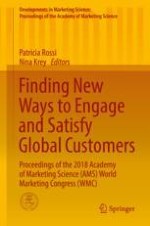2019 | OriginalPaper | Buchkapitel
Faith in God versus Faith in Wealth: Belief in a Higher Spiritual Power as a Determiner of Quality of Financial Life: An Abstract
verfasst von : Heejung Park, Saman Zehra
Erschienen in: Finding New Ways to Engage and Satisfy Global Customers
Aktivieren Sie unsere intelligente Suche, um passende Fachinhalte oder Patente zu finden.
Wählen Sie Textabschnitte aus um mit Künstlicher Intelligenz passenden Patente zu finden. powered by
Markieren Sie Textabschnitte, um KI-gestützt weitere passende Inhalte zu finden. powered by
